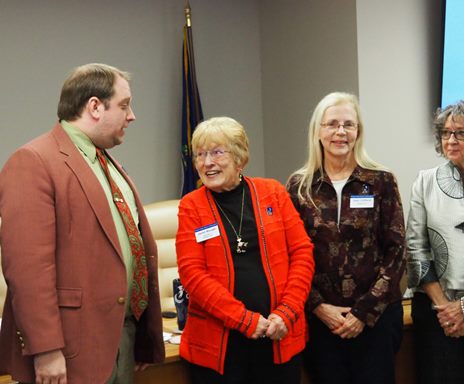Member Ben Jones rejects political hostility directed at LGBTQ community

by Tim Carpenter, Kansas Reflector
Topeka — Kansas Board of Education member Ben Jones addressed colleagues at his final meeting Wednesday by raising concern about the influence of Christian nationalists in government, the Republican Party’s rejection of social and emotional learning in schools and the ostracizing of LGBTQ teachers and students.
Jones, a Sterling resident elected four years ago to represent a portion of southwest Kansas, lost his GOP primary in August to Dennis Hershberger of Hutchinson. Hershberger is among three Republicans elected in November to join the 10-member state Board of Education in January.
Jones said rise of Christian nationalism in the United States should be viewed as an assault on the liberty of individuals to choose a personal religious path. Influence wielded by Christian fundamentalists threatens to infuse government, including public education, with religious ideology reinforced by government “coercion,” Jones said.
“This narrative has now taken over the Republican Party in a way I never thought possible 10 years ago,” he said. “This is the belief that we are God’s chosen nation and we must follow the dictates of carefully selected portions of the Bible. This is dangerous — replacing the grace of Jesus Christ with the yoke of the law.”
Michael Kuckelman, chairman of the Kansas Republican Party, didn’t respond to a request for comment.
During the board meeting, Jones accused Christian fundamentalists of damaging conservatism in the quest for power. This misguided agenda sought to deny LGBTQ individuals from teaching in schools, said Jones, who has supported same-sex marriage.
“Gay students have a right to a safe and quality public education,” he said. “Gay teachers should be allowed to teach in our classrooms.”
Jones, a Republican, said a person’s morality couldn’t be determined by political party affiliation and a partisan group shouldn’t operate as some type of morality police. He said Republicans had falsely denounced social and emotional learning in schools and alleged teachers were advancing “critical race theory,” which represents the idea racism was a cultural construction designed to oppress people of color.
He said social and emotional learning — some state Board of Education members object to use of the phrase — was important because high school graduates needed a framework that would support their continued learning throughout life.
Jean Clifford, a first-term Republican state board member from Garden City, fell in the primary to Cathy Hopkins of Hays. She said she was honored to work the past four years on behalf of “dedicated, hard-working individuals who truly want to see their students succeed.”
She pointed to a misconception held by some people the state Board of Education had authority to mandate education reform. The state Board of Education, she said, had constitutional powers to guide public education statewide. For example, the state Board of Education recommended school districts stop using offensive Native American mascots, but didn’t have the ability to require the change.
“We provide a structure and guidance to local districts,” said Clifford, a former member of the Garden City school board. “Local boards of education and local control is a fundamental principle in our state. That is something we need to honor whether we agree with the decision at the local level or not.”
The third to depart the 10-member state Board of Education in January will be Janet Waugh of Kansas City, Kansas. She didn’t seek reelection and will complete a 24-year run on the board. She was on the Turner school board for 15 years and described teachers as “my heroes.”
“It takes a village to raise a board member,” Waugh said. “I’ve had a heck of a village supporting me.”
She said her state Board of Education district included a concentration of low-income students. She was proud the state Board of Education’s policy was to meet needs of every single child.
“Our students didn’t choose to be born into poverty. Education is the only escape for many of these students. Please, I ask of you, do not allow their zip code to determine the type of education they receive,” Waugh said.
She apologized for doubting the abilities of Randy Watson, who was named Kansas commissioner of education in 2014 while serving as superintendent of schools in McPherson.
“I was wrong,” Waugh said. “He’s been an amazing commissioner who has been a wonderful leader for the state.”
Kansas Reflector stories, www.kansasreflector.com, may be republished online or in print under Creative Commons license CC BY-NC-ND 4.0.
See more at https://kansasreflector.com/2022/12/14/outgoing-kansas-board-of-education-member-decries-gops-embrace-of-christian-nationalism/
